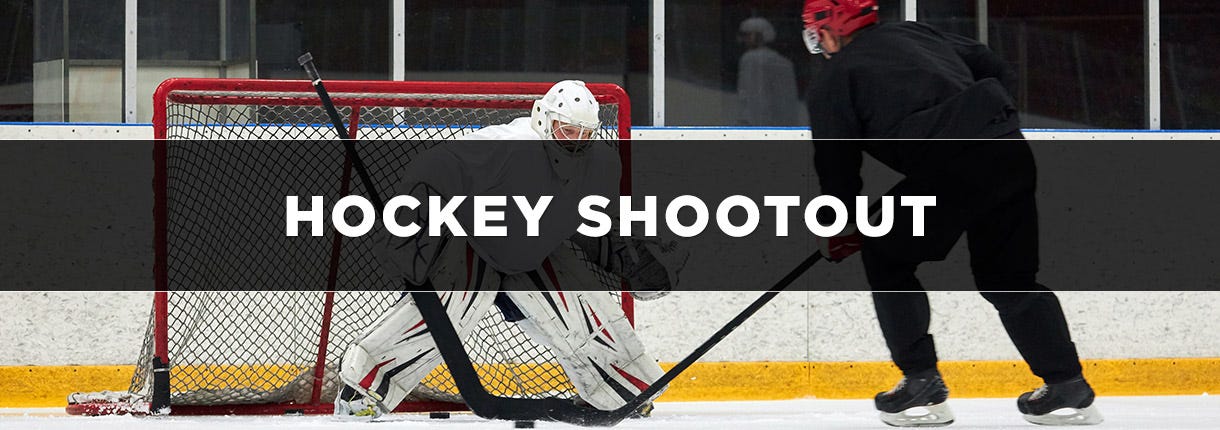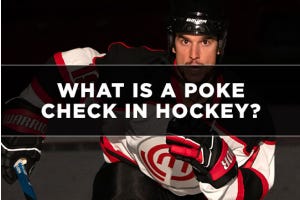Hockey Shootout Rules & FAQs

As the tension of a tied up game builds and the final seconds of play are in motion, hockey shootouts are an exciting way to determine a winner when regulation and overtime don’t change the score. Learn about the rules of hockey shootouts and find the answers to some frequently asked questions about this exciting aspect of the game, so the next time you’re watching a shootout, you’ll know exactly what you’re looking at.
In this article, we’ll cover:
What Is a Shootout in Hockey?
A shootout is a tie-breaking procedure used in ice hockey games when regulation time and overtime periods have ended and both teams are still tied. When a hockey game goes to a shootout, each team chooses 3 players who’ll take turns attempting penalty shots. The objective is simple: score more goals than your opponent during these attempts.
The shootout continues until there’s a clear winner. If both teams remain tied after their initial 3 shots, additional rounds are played using a sudden-death format, where each team sends out 1 shooter at a time until a team scores.
Shootouts provide an intense finale for fans, who watch individual skill battles between shooters trying to deceive goalies with dekes or quick shots. The goaltenders attempt to read their opponent’s moves and make exciting saves.
How Does a Hockey Shootout Work?
The NHL follows a specific procedure for shootouts. In each shootout, the following happens:
- Each team’s coach will select 3 shooters to take turns attempting to score.
- Players can’t be serving a penalty.
- The home team decides if they want to shoot first or second.
- The order of attempts then alternates between teams.
- The puck is played from center ice.
- The goaltenders defend the goal at the end of the ice closest to their bench.
- If there’s no winner after all 6 shots have been taken (3 from each side), play will move to sudden death until the first team scores.
When Does a Shootout Happen in Hockey?
The shootout is designed to determine the winner of the match without requiring additional periods that could lead to player fatigue or injury.
The Overtime Period
Before a shootout can take place, there must be an overtime period. If the score remains equal after three 20-minute periods, teams proceed to a 5-minute sudden-death overtime period with 3 skaters per side (excluding goaltenders). If either team scores during this extra frame, they win immediately; otherwise, it’s time for a thrilling shootout.
Initiating a Shootout
If no goals are scored during the 5-minute overtime period in regular-season NHL games (or in other leagues following similar rules), it’s officially time for a shootout. Both coaches submit their list of 3 shooters who’ll participate in alternating turns trying to score on opposing goalies.
How Often Do NHL Games Go to Shootout?
Factors like rule modifications or team tactics can cause variations in the frequency of shootouts from season to season. According to Hockey-Reference.com, during the 2018-19 NHL regular season, 138 games went beyond regulation time. Out of those, 62 went into a shootout – that’s roughly 45% of all overtime games. This number has fluctuated from year to year:
- 2017-18 Season: Out of 136 overtime games, 68 (50%) went into a shootout.
- 2016-17 Season: Out of 149 overtime games, only 55 (37%) resulted in a shootout.
- 2015-16 Season: A total of 168 overtime matches took place, with exactly half (84) ending up in a shootout scenario.
Hockey Shootout Rules
Understanding regulation rules will help you appreciate this thrilling part of the game even more.
- Number of Shooters: Each team selects 3 players to participate in the shootout. If the score remains tied after both teams have taken their shots, additional rounds with 1 shooter per team are held until someone scores.
- Order of Shooters: The home team can choose whether to shoot first or second. Teams alternate taking shots.
- Puck Placement: The puck is played from center ice before each shot attempt. Players can move toward the goal, but they can’t backtrack once they’ve touched the puck.
No Rebounds Allowed: In a hockey shootout, only 1 shot attempt is permitted per player – no rebounds are allowed. - Fair Play: Players from both teams must remain on their respective benches during the shootout, and no player can take more than 1 shot until all eligible players have had a turn. This ensures fair play and equal opportunities for each team.
- Goalie Restrictions: Goalies are not allowed to throw their stick or any other equipment at the shooter in an attempt to make a save. Doing so will result in an automatic goal being awarded to the opposing team. (source)
- Determining a Winner: The team with more successful shots after 3 rounds (or additional sudden-death rounds if necessary) is declared the shootout winner and earns an extra point in the standings.
FAQs About Hockey Shootouts
Is there a shootout in playoff hockey?
No, there is no shootout in playoff hockey. During playoff series, games tied after regulation time continue with sudden-death overtime periods until a winner is determined.
Why is there no shootout in playoff hockey?
The absence of shootouts in playoff hockey stems from the belief that it’s more fitting for teams to decide crucial games through regular gameplay rather than individual skill contests like shootouts. This approach ensures that all aspects of team play contribute to determining which team advances or wins championships.
When does the NHL go to a shootout?
Hockey goes to a shootout during regular season NHL games when the game is tied after the overtime period. Each team gets 3 shootout attempts, and if the score remains tied, the shootout continues with a sudden-death format until one team scores and wins.
How does a shootout work in the NHL?
A shootout consists of 3 rounds where each team selects 1 player per round who takes an unopposed shot on goal against the opposing goaltender. The team with more successful attempts at the end of 3 rounds wins. If tied after 3 rounds, additional “sudden death” rounds occur until a team emerges victorious.
Does a shootout win count as a win?
In NHL standings, a shootout win counts as 2 points (the same value as any other victory). However, for tie-breaking purposes in playoff seeding or qualification scenarios, regulation and overtime wins are given more weight than shootout victories.
What is the longest NHL shootout ever?
The Panthers and Capitals squared off in a marathon shootout, with Florida ultimately prevailing after 20 rounds of play when Nick Bjugstad put a puck past Braden Holtby.
Shop Our Selection of Hockey Sticks to Be Shootout-Ready
Preparing for a hockey shootout means having the right equipment, which starts with choosing the perfect hockey stick. At HockeyMonkey, we offer a wide range of high-quality sticks and other gear and equipment, from top brands like Bauer, CCM, Warrior, and more.
If you want to make sure your equipment is up-to-date and ready for shootout action, head over to HockeyMonkey today to browse our full selection of hockey sticks today!









Login and Registration Form
or
Create an account